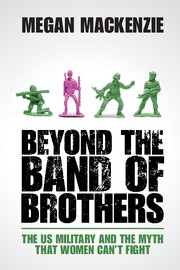Book contents
- Frontmatter
- Dedication
- Contents
- List of tables
- Acknowledgments
- Introduction: myths, men, and policy making
- 1 The combat exclusion is a story we tell ourselves … about men
- 2 The disintegration of the combat exclusion in Iraq and Afghanistan
- 3 It just doesn't feel right: emotion and the combat exclusion policy
- 4 Faster, stronger, more male: women and the failure of physical standards
- 5 Sex, cohesion, and national security
- 6 Using online debates to map public reaction to the combat exclusion
- Conclusion
- Bibliography
- Index
5 - Sex, cohesion, and national security
Published online by Cambridge University Press: 05 July 2015
- Frontmatter
- Dedication
- Contents
- List of tables
- Acknowledgments
- Introduction: myths, men, and policy making
- 1 The combat exclusion is a story we tell ourselves … about men
- 2 The disintegration of the combat exclusion in Iraq and Afghanistan
- 3 It just doesn't feel right: emotion and the combat exclusion policy
- 4 Faster, stronger, more male: women and the failure of physical standards
- 5 Sex, cohesion, and national security
- 6 Using online debates to map public reaction to the combat exclusion
- Conclusion
- Bibliography
- Index
Summary
One of the most common arguments used to justify the combat exclusion in the US and elsewhere has been that women undermine the types of bonding necessary for combat troops to operate effectively. This ‘cohesion hypothesis’ presumes a positive relationship between group cohesion and soldier performance, and a negative relationship between the inclusion of women and the rates of bonding and trust necessary for such cohesion. In other words, all-male combat units are more cohesive, and therefore more effective, than mixed-gender units. This became the dominant rationale for excluding women from US combat operations in the two decades leading up to the policy change, and it remains the primary justification for sustaining combat exclusions in several militaries across the world. Erin Solaro summarizes the significance of the cohesion hypothesis: “The single biggest issue in integrating women into the military, much less into the combat arms, has been held to be cohesion: the emotional bonds between members of a unit … In the military mind, cohesion had become more than just a contributor to combat effectiveness. It was now synonymous with it.”
The link between cohesion and troop performance was perhaps most clearly articulated in policy terms in the 1992 Presidential Commission on the Assignment of Women, which was established to review the combat exclusion. The commission recommended that the combat exclusion be sustained, citing that although “[t]here are no military studies concerning mixed-gender combat unit cohesion … some research indicates that unit cohesion could be affected by the introduction of women.” The commission identified several factors that could impact cohesion, including the “real or perceived inability of women to carry their weight without male assistance, a ‘zero privacy’ environment on the battlefield, interference with male bonding, cultural values, the desire of men to protect women, inappropriate male/female relationships, and pregnancy – particularly when perceived as a way to escape from combat duty.”
- Type
- Chapter
- Information
- Beyond the Band of BrothersThe US Military and the Myth that Women Can't Fight, pp. 134 - 154Publisher: Cambridge University PressPrint publication year: 2015
- 3
- Cited by



